Comprehensive Report on Modern Psychology: Key Concepts and Theories
VerifiedAdded on 2023/01/03
|7
|1889
|75
Report
AI Summary
This report provides a comprehensive overview of modern psychology, beginning with its historical context and the contributions of key figures like Wilhelm Wundt, William James, and Ivan Pavlov. It explores the development of psychology as a scientific discipline, examining empirical evidence and different theoretical perspectives, including psychodynamic, behavioral, and cognitive approaches. The report highlights the significance of Pavlov's classical conditioning and its impact on the field, emphasizing how these perspectives have shaped the understanding of human behavior and mental processes. Various research and contributions from different psychologist are also discussed, providing a well-rounded view of the subject. This report is a valuable resource for students seeking to understand the foundations and evolution of modern psychology.

PSYCHOLOGY
Paraphrase This Document
Need a fresh take? Get an instant paraphrase of this document with our AI Paraphraser
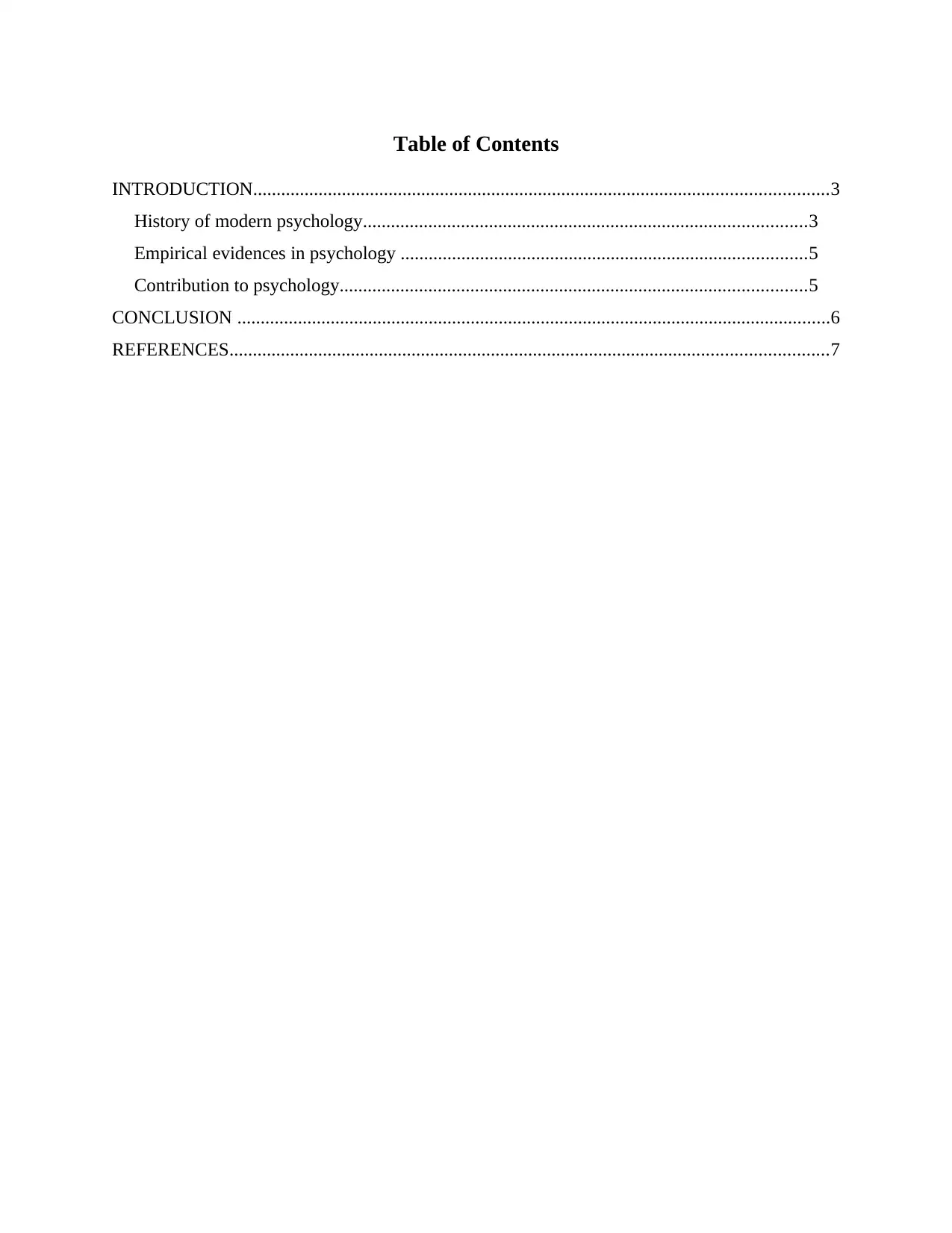
Table of Contents
INTRODUCTION...........................................................................................................................3
History of modern psychology...............................................................................................3
Empirical evidences in psychology .......................................................................................5
Contribution to psychology....................................................................................................5
CONCLUSION ...............................................................................................................................6
REFERENCES................................................................................................................................7
INTRODUCTION...........................................................................................................................3
History of modern psychology...............................................................................................3
Empirical evidences in psychology .......................................................................................5
Contribution to psychology....................................................................................................5
CONCLUSION ...............................................................................................................................6
REFERENCES................................................................................................................................7
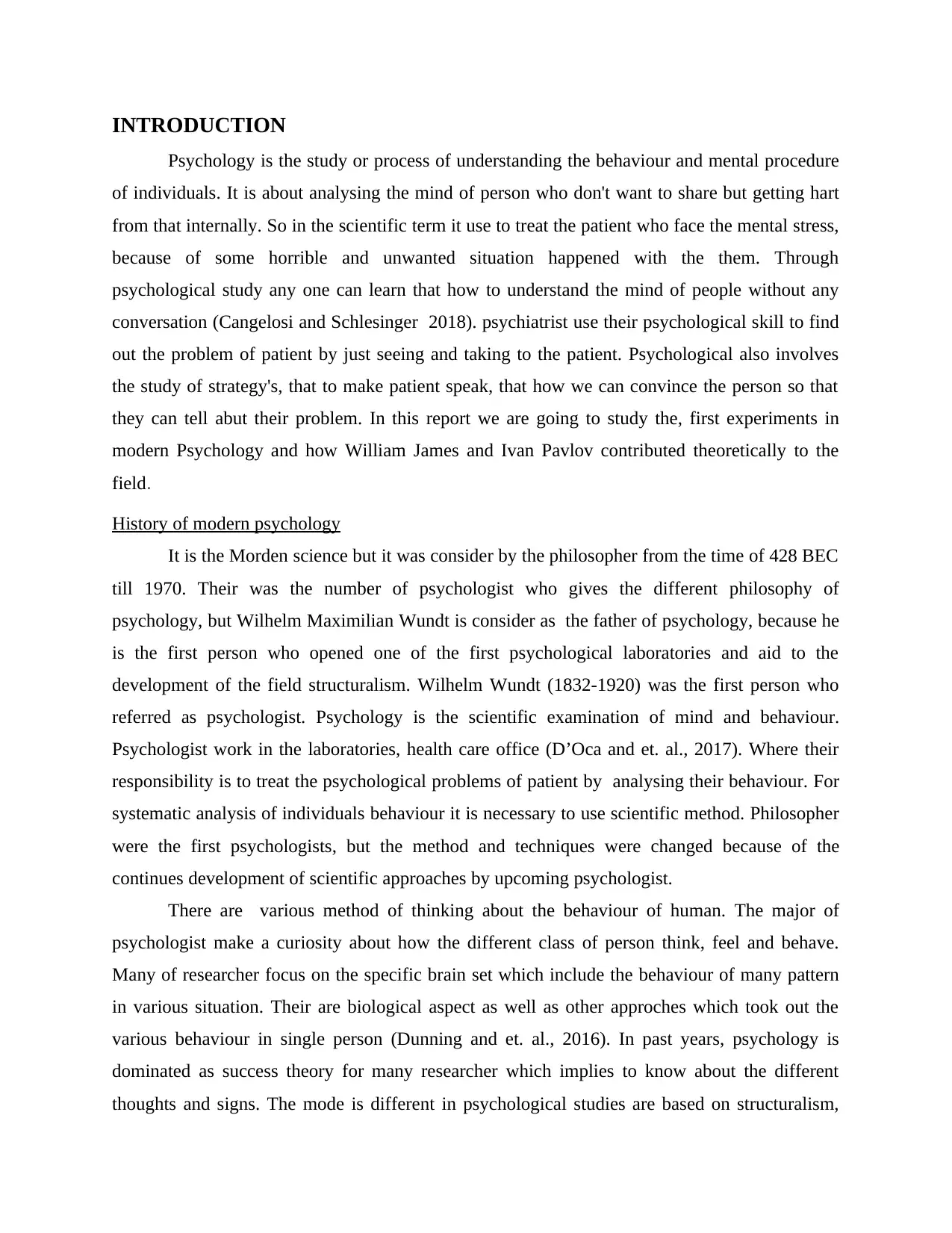
INTRODUCTION
Psychology is the study or process of understanding the behaviour and mental procedure
of individuals. It is about analysing the mind of person who don't want to share but getting hart
from that internally. So in the scientific term it use to treat the patient who face the mental stress,
because of some horrible and unwanted situation happened with the them. Through
psychological study any one can learn that how to understand the mind of people without any
conversation (Cangelosi and Schlesinger 2018). psychiatrist use their psychological skill to find
out the problem of patient by just seeing and taking to the patient. Psychological also involves
the study of strategy's, that to make patient speak, that how we can convince the person so that
they can tell abut their problem. In this report we are going to study the, first experiments in
modern Psychology and how William James and Ivan Pavlov contributed theoretically to the
field.
History of modern psychology
It is the Morden science but it was consider by the philosopher from the time of 428 BEC
till 1970. Their was the number of psychologist who gives the different philosophy of
psychology, but Wilhelm Maximilian Wundt is consider as the father of psychology, because he
is the first person who opened one of the first psychological laboratories and aid to the
development of the field structuralism. Wilhelm Wundt (1832-1920) was the first person who
referred as psychologist. Psychology is the scientific examination of mind and behaviour.
Psychologist work in the laboratories, health care office (D’Oca and et. al., 2017). Where their
responsibility is to treat the psychological problems of patient by analysing their behaviour. For
systematic analysis of individuals behaviour it is necessary to use scientific method. Philosopher
were the first psychologists, but the method and techniques were changed because of the
continues development of scientific approaches by upcoming psychologist.
There are various method of thinking about the behaviour of human. The major of
psychologist make a curiosity about how the different class of person think, feel and behave.
Many of researcher focus on the specific brain set which include the behaviour of many pattern
in various situation. Their are biological aspect as well as other approches which took out the
various behaviour in single person (Dunning and et. al., 2016). In past years, psychology is
dominated as success theory for many researcher which implies to know about the different
thoughts and signs. The mode is different in psychological studies are based on structuralism,
Psychology is the study or process of understanding the behaviour and mental procedure
of individuals. It is about analysing the mind of person who don't want to share but getting hart
from that internally. So in the scientific term it use to treat the patient who face the mental stress,
because of some horrible and unwanted situation happened with the them. Through
psychological study any one can learn that how to understand the mind of people without any
conversation (Cangelosi and Schlesinger 2018). psychiatrist use their psychological skill to find
out the problem of patient by just seeing and taking to the patient. Psychological also involves
the study of strategy's, that to make patient speak, that how we can convince the person so that
they can tell abut their problem. In this report we are going to study the, first experiments in
modern Psychology and how William James and Ivan Pavlov contributed theoretically to the
field.
History of modern psychology
It is the Morden science but it was consider by the philosopher from the time of 428 BEC
till 1970. Their was the number of psychologist who gives the different philosophy of
psychology, but Wilhelm Maximilian Wundt is consider as the father of psychology, because he
is the first person who opened one of the first psychological laboratories and aid to the
development of the field structuralism. Wilhelm Wundt (1832-1920) was the first person who
referred as psychologist. Psychology is the scientific examination of mind and behaviour.
Psychologist work in the laboratories, health care office (D’Oca and et. al., 2017). Where their
responsibility is to treat the psychological problems of patient by analysing their behaviour. For
systematic analysis of individuals behaviour it is necessary to use scientific method. Philosopher
were the first psychologists, but the method and techniques were changed because of the
continues development of scientific approaches by upcoming psychologist.
There are various method of thinking about the behaviour of human. The major of
psychologist make a curiosity about how the different class of person think, feel and behave.
Many of researcher focus on the specific brain set which include the behaviour of many pattern
in various situation. Their are biological aspect as well as other approches which took out the
various behaviour in single person (Dunning and et. al., 2016). In past years, psychology is
dominated as success theory for many researcher which implies to know about the different
thoughts and signs. The mode is different in psychological studies are based on structuralism,
⊘ This is a preview!⊘
Do you want full access?
Subscribe today to unlock all pages.

Trusted by 1+ million students worldwide
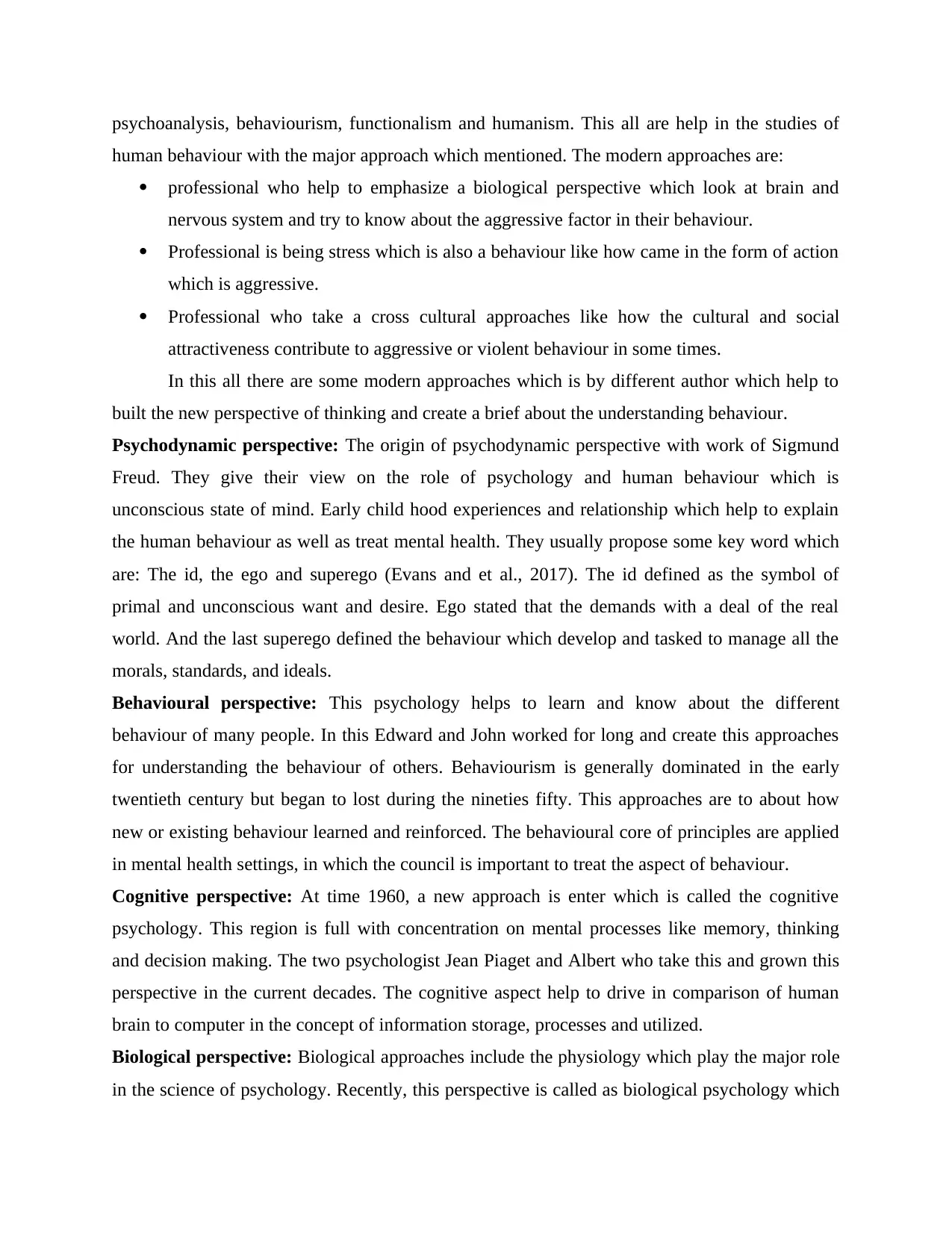
psychoanalysis, behaviourism, functionalism and humanism. This all are help in the studies of
human behaviour with the major approach which mentioned. The modern approaches are:
professional who help to emphasize a biological perspective which look at brain and
nervous system and try to know about the aggressive factor in their behaviour.
Professional is being stress which is also a behaviour like how came in the form of action
which is aggressive.
Professional who take a cross cultural approaches like how the cultural and social
attractiveness contribute to aggressive or violent behaviour in some times.
In this all there are some modern approaches which is by different author which help to
built the new perspective of thinking and create a brief about the understanding behaviour.
Psychodynamic perspective: The origin of psychodynamic perspective with work of Sigmund
Freud. They give their view on the role of psychology and human behaviour which is
unconscious state of mind. Early child hood experiences and relationship which help to explain
the human behaviour as well as treat mental health. They usually propose some key word which
are: The id, the ego and superego (Evans and et al., 2017). The id defined as the symbol of
primal and unconscious want and desire. Ego stated that the demands with a deal of the real
world. And the last superego defined the behaviour which develop and tasked to manage all the
morals, standards, and ideals.
Behavioural perspective: This psychology helps to learn and know about the different
behaviour of many people. In this Edward and John worked for long and create this approaches
for understanding the behaviour of others. Behaviourism is generally dominated in the early
twentieth century but began to lost during the nineties fifty. This approaches are to about how
new or existing behaviour learned and reinforced. The behavioural core of principles are applied
in mental health settings, in which the council is important to treat the aspect of behaviour.
Cognitive perspective: At time 1960, a new approach is enter which is called the cognitive
psychology. This region is full with concentration on mental processes like memory, thinking
and decision making. The two psychologist Jean Piaget and Albert who take this and grown this
perspective in the current decades. The cognitive aspect help to drive in comparison of human
brain to computer in the concept of information storage, processes and utilized.
Biological perspective: Biological approaches include the physiology which play the major role
in the science of psychology. Recently, this perspective is called as biological psychology which
human behaviour with the major approach which mentioned. The modern approaches are:
professional who help to emphasize a biological perspective which look at brain and
nervous system and try to know about the aggressive factor in their behaviour.
Professional is being stress which is also a behaviour like how came in the form of action
which is aggressive.
Professional who take a cross cultural approaches like how the cultural and social
attractiveness contribute to aggressive or violent behaviour in some times.
In this all there are some modern approaches which is by different author which help to
built the new perspective of thinking and create a brief about the understanding behaviour.
Psychodynamic perspective: The origin of psychodynamic perspective with work of Sigmund
Freud. They give their view on the role of psychology and human behaviour which is
unconscious state of mind. Early child hood experiences and relationship which help to explain
the human behaviour as well as treat mental health. They usually propose some key word which
are: The id, the ego and superego (Evans and et al., 2017). The id defined as the symbol of
primal and unconscious want and desire. Ego stated that the demands with a deal of the real
world. And the last superego defined the behaviour which develop and tasked to manage all the
morals, standards, and ideals.
Behavioural perspective: This psychology helps to learn and know about the different
behaviour of many people. In this Edward and John worked for long and create this approaches
for understanding the behaviour of others. Behaviourism is generally dominated in the early
twentieth century but began to lost during the nineties fifty. This approaches are to about how
new or existing behaviour learned and reinforced. The behavioural core of principles are applied
in mental health settings, in which the council is important to treat the aspect of behaviour.
Cognitive perspective: At time 1960, a new approach is enter which is called the cognitive
psychology. This region is full with concentration on mental processes like memory, thinking
and decision making. The two psychologist Jean Piaget and Albert who take this and grown this
perspective in the current decades. The cognitive aspect help to drive in comparison of human
brain to computer in the concept of information storage, processes and utilized.
Biological perspective: Biological approaches include the physiology which play the major role
in the science of psychology. Recently, this perspective is called as biological psychology which
Paraphrase This Document
Need a fresh take? Get an instant paraphrase of this document with our AI Paraphraser
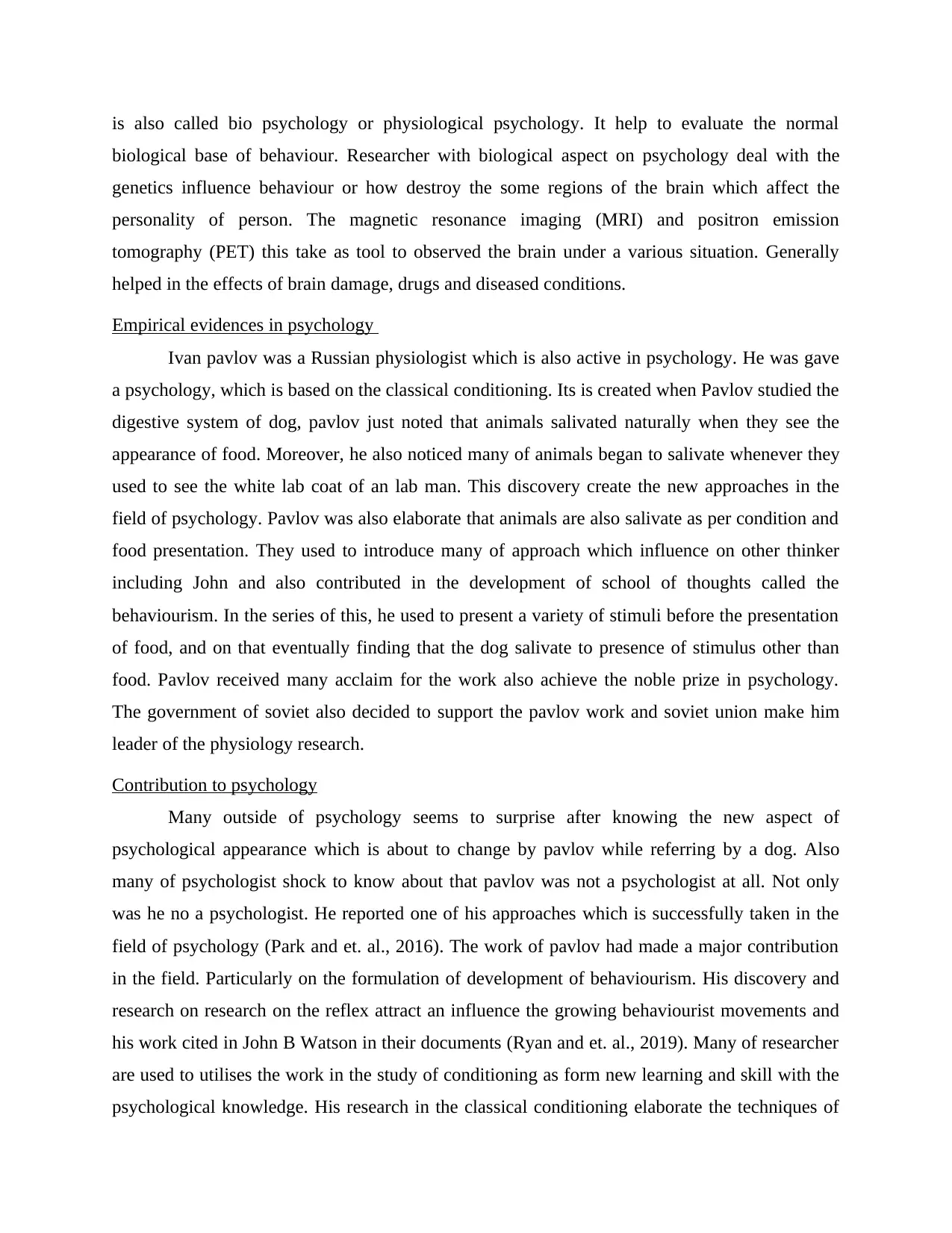
is also called bio psychology or physiological psychology. It help to evaluate the normal
biological base of behaviour. Researcher with biological aspect on psychology deal with the
genetics influence behaviour or how destroy the some regions of the brain which affect the
personality of person. The magnetic resonance imaging (MRI) and positron emission
tomography (PET) this take as tool to observed the brain under a various situation. Generally
helped in the effects of brain damage, drugs and diseased conditions.
Empirical evidences in psychology
Ivan pavlov was a Russian physiologist which is also active in psychology. He was gave
a psychology, which is based on the classical conditioning. Its is created when Pavlov studied the
digestive system of dog, pavlov just noted that animals salivated naturally when they see the
appearance of food. Moreover, he also noticed many of animals began to salivate whenever they
used to see the white lab coat of an lab man. This discovery create the new approaches in the
field of psychology. Pavlov was also elaborate that animals are also salivate as per condition and
food presentation. They used to introduce many of approach which influence on other thinker
including John and also contributed in the development of school of thoughts called the
behaviourism. In the series of this, he used to present a variety of stimuli before the presentation
of food, and on that eventually finding that the dog salivate to presence of stimulus other than
food. Pavlov received many acclaim for the work also achieve the noble prize in psychology.
The government of soviet also decided to support the pavlov work and soviet union make him
leader of the physiology research.
Contribution to psychology
Many outside of psychology seems to surprise after knowing the new aspect of
psychological appearance which is about to change by pavlov while referring by a dog. Also
many of psychologist shock to know about that pavlov was not a psychologist at all. Not only
was he no a psychologist. He reported one of his approaches which is successfully taken in the
field of psychology (Park and et. al., 2016). The work of pavlov had made a major contribution
in the field. Particularly on the formulation of development of behaviourism. His discovery and
research on research on the reflex attract an influence the growing behaviourist movements and
his work cited in John B Watson in their documents (Ryan and et. al., 2019). Many of researcher
are used to utilises the work in the study of conditioning as form new learning and skill with the
psychological knowledge. His research in the classical conditioning elaborate the techniques of
biological base of behaviour. Researcher with biological aspect on psychology deal with the
genetics influence behaviour or how destroy the some regions of the brain which affect the
personality of person. The magnetic resonance imaging (MRI) and positron emission
tomography (PET) this take as tool to observed the brain under a various situation. Generally
helped in the effects of brain damage, drugs and diseased conditions.
Empirical evidences in psychology
Ivan pavlov was a Russian physiologist which is also active in psychology. He was gave
a psychology, which is based on the classical conditioning. Its is created when Pavlov studied the
digestive system of dog, pavlov just noted that animals salivated naturally when they see the
appearance of food. Moreover, he also noticed many of animals began to salivate whenever they
used to see the white lab coat of an lab man. This discovery create the new approaches in the
field of psychology. Pavlov was also elaborate that animals are also salivate as per condition and
food presentation. They used to introduce many of approach which influence on other thinker
including John and also contributed in the development of school of thoughts called the
behaviourism. In the series of this, he used to present a variety of stimuli before the presentation
of food, and on that eventually finding that the dog salivate to presence of stimulus other than
food. Pavlov received many acclaim for the work also achieve the noble prize in psychology.
The government of soviet also decided to support the pavlov work and soviet union make him
leader of the physiology research.
Contribution to psychology
Many outside of psychology seems to surprise after knowing the new aspect of
psychological appearance which is about to change by pavlov while referring by a dog. Also
many of psychologist shock to know about that pavlov was not a psychologist at all. Not only
was he no a psychologist. He reported one of his approaches which is successfully taken in the
field of psychology (Park and et. al., 2016). The work of pavlov had made a major contribution
in the field. Particularly on the formulation of development of behaviourism. His discovery and
research on research on the reflex attract an influence the growing behaviourist movements and
his work cited in John B Watson in their documents (Ryan and et. al., 2019). Many of researcher
are used to utilises the work in the study of conditioning as form new learning and skill with the
psychological knowledge. His research in the classical conditioning elaborate the techniques of
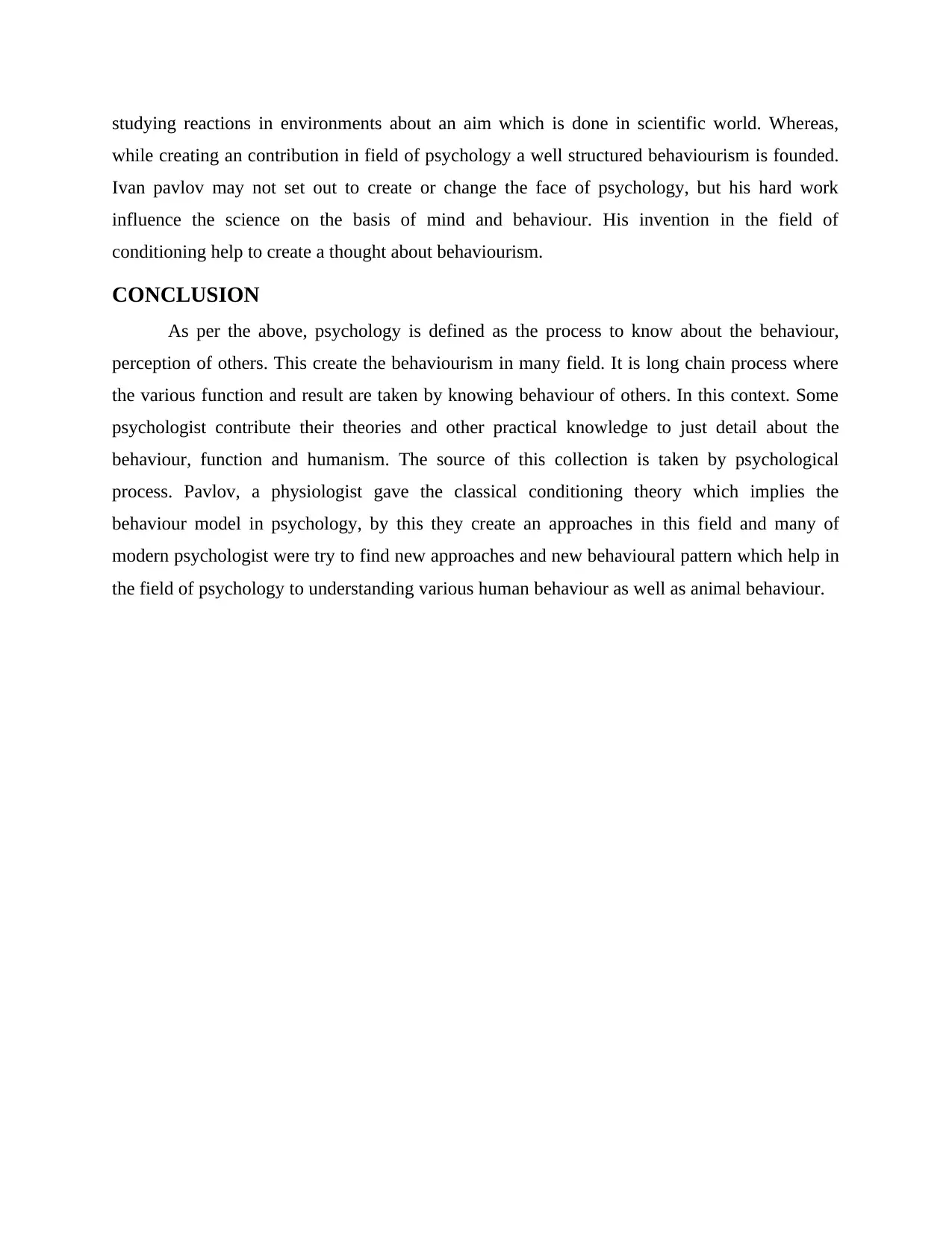
studying reactions in environments about an aim which is done in scientific world. Whereas,
while creating an contribution in field of psychology a well structured behaviourism is founded.
Ivan pavlov may not set out to create or change the face of psychology, but his hard work
influence the science on the basis of mind and behaviour. His invention in the field of
conditioning help to create a thought about behaviourism.
CONCLUSION
As per the above, psychology is defined as the process to know about the behaviour,
perception of others. This create the behaviourism in many field. It is long chain process where
the various function and result are taken by knowing behaviour of others. In this context. Some
psychologist contribute their theories and other practical knowledge to just detail about the
behaviour, function and humanism. The source of this collection is taken by psychological
process. Pavlov, a physiologist gave the classical conditioning theory which implies the
behaviour model in psychology, by this they create an approaches in this field and many of
modern psychologist were try to find new approaches and new behavioural pattern which help in
the field of psychology to understanding various human behaviour as well as animal behaviour.
while creating an contribution in field of psychology a well structured behaviourism is founded.
Ivan pavlov may not set out to create or change the face of psychology, but his hard work
influence the science on the basis of mind and behaviour. His invention in the field of
conditioning help to create a thought about behaviourism.
CONCLUSION
As per the above, psychology is defined as the process to know about the behaviour,
perception of others. This create the behaviourism in many field. It is long chain process where
the various function and result are taken by knowing behaviour of others. In this context. Some
psychologist contribute their theories and other practical knowledge to just detail about the
behaviour, function and humanism. The source of this collection is taken by psychological
process. Pavlov, a physiologist gave the classical conditioning theory which implies the
behaviour model in psychology, by this they create an approaches in this field and many of
modern psychologist were try to find new approaches and new behavioural pattern which help in
the field of psychology to understanding various human behaviour as well as animal behaviour.
⊘ This is a preview!⊘
Do you want full access?
Subscribe today to unlock all pages.

Trusted by 1+ million students worldwide
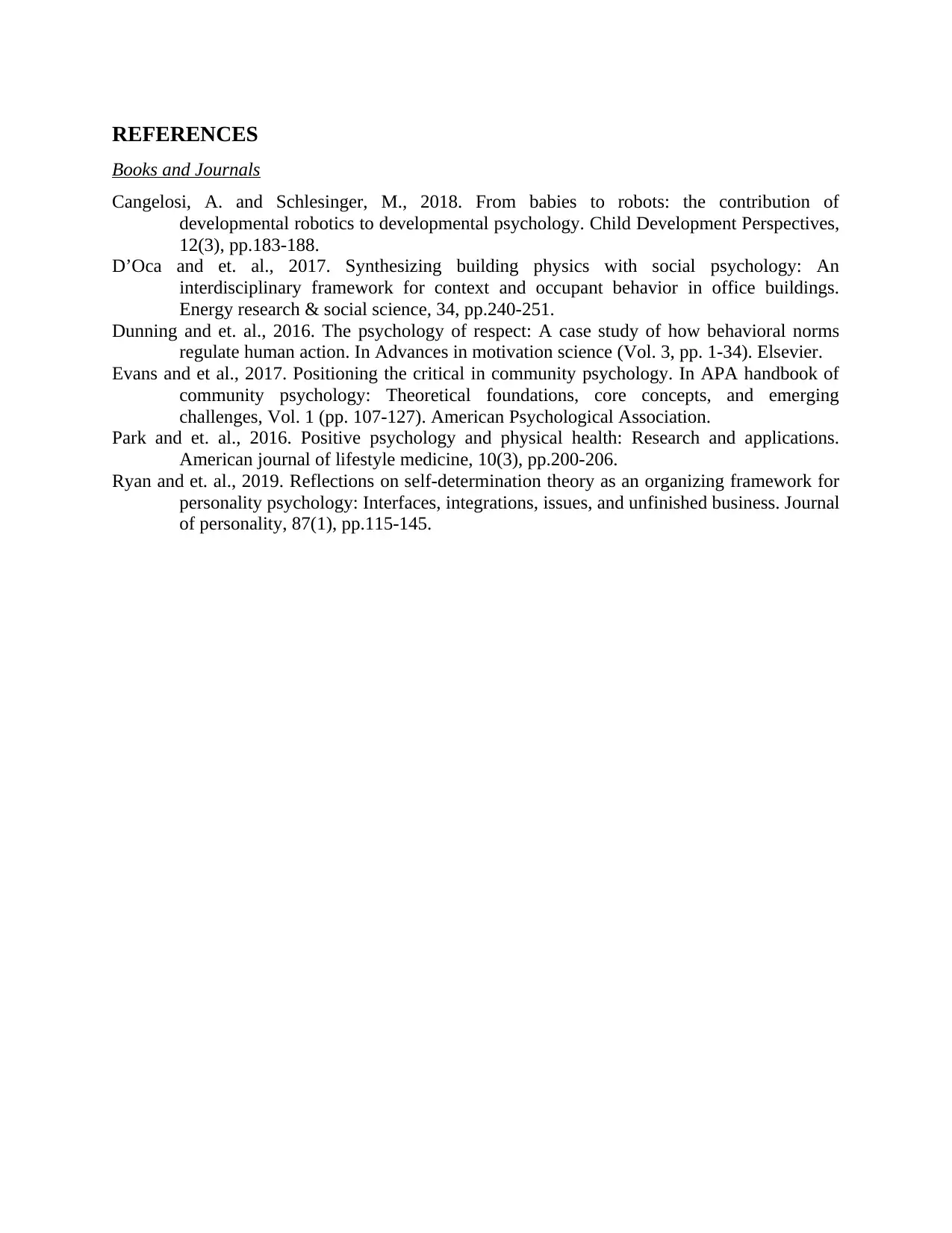
REFERENCES
Books and Journals
Cangelosi, A. and Schlesinger, M., 2018. From babies to robots: the contribution of
developmental robotics to developmental psychology. Child Development Perspectives,
12(3), pp.183-188.
D’Oca and et. al., 2017. Synthesizing building physics with social psychology: An
interdisciplinary framework for context and occupant behavior in office buildings.
Energy research & social science, 34, pp.240-251.
Dunning and et. al., 2016. The psychology of respect: A case study of how behavioral norms
regulate human action. In Advances in motivation science (Vol. 3, pp. 1-34). Elsevier.
Evans and et al., 2017. Positioning the critical in community psychology. In APA handbook of
community psychology: Theoretical foundations, core concepts, and emerging
challenges, Vol. 1 (pp. 107-127). American Psychological Association.
Park and et. al., 2016. Positive psychology and physical health: Research and applications.
American journal of lifestyle medicine, 10(3), pp.200-206.
Ryan and et. al., 2019. Reflections on self‐determination theory as an organizing framework for
personality psychology: Interfaces, integrations, issues, and unfinished business. Journal
of personality, 87(1), pp.115-145.
Books and Journals
Cangelosi, A. and Schlesinger, M., 2018. From babies to robots: the contribution of
developmental robotics to developmental psychology. Child Development Perspectives,
12(3), pp.183-188.
D’Oca and et. al., 2017. Synthesizing building physics with social psychology: An
interdisciplinary framework for context and occupant behavior in office buildings.
Energy research & social science, 34, pp.240-251.
Dunning and et. al., 2016. The psychology of respect: A case study of how behavioral norms
regulate human action. In Advances in motivation science (Vol. 3, pp. 1-34). Elsevier.
Evans and et al., 2017. Positioning the critical in community psychology. In APA handbook of
community psychology: Theoretical foundations, core concepts, and emerging
challenges, Vol. 1 (pp. 107-127). American Psychological Association.
Park and et. al., 2016. Positive psychology and physical health: Research and applications.
American journal of lifestyle medicine, 10(3), pp.200-206.
Ryan and et. al., 2019. Reflections on self‐determination theory as an organizing framework for
personality psychology: Interfaces, integrations, issues, and unfinished business. Journal
of personality, 87(1), pp.115-145.
1 out of 7
Related Documents
Your All-in-One AI-Powered Toolkit for Academic Success.
+13062052269
info@desklib.com
Available 24*7 on WhatsApp / Email
![[object Object]](/_next/static/media/star-bottom.7253800d.svg)
Unlock your academic potential
Copyright © 2020–2026 A2Z Services. All Rights Reserved. Developed and managed by ZUCOL.





